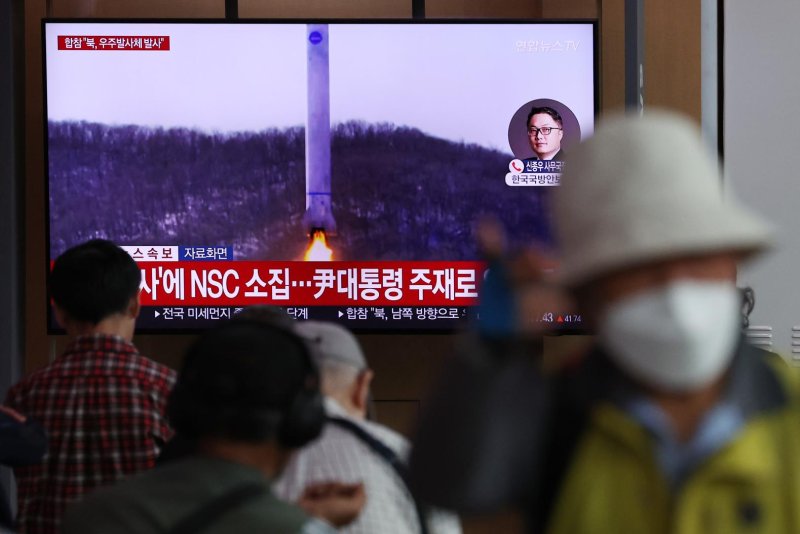1 of 2 | North Korea's attempted launch of a spy satellite ended in failure on Wednesday when the rocket lost thrust after its first stage separated, state-run KCNA said. Photo by Yonhap
SEOUL, May 31 (UPI) -- North Korea's attempted launch of a spy satellite ended in failure on Wednesday, splashing into the Yellow Sea after an "abnormal" flight, the South Korean military said.
The North confirmed the failed launch, saying in state media that its new Chollima-1 rocket fell into the sea "after losing thrust due to the abnormal starting of the second-stage engine after the separation of the first stage."
The rocket was fired from the Sohae Satellite Launching Ground and was carrying a military reconnaissance satellite, the Malligyong-1, Korean Central News Agency reported.
Pyongyang will attempt another launch as soon as possible, the KCNA report said.
South Korea's Joint Chiefs of Staff said in a text message to reporters that it detected the launch from Tongchang-ri on the North's west coast, where the Sohae facility is located, at 6:29 a.m.
The projectile fell into waters roughly 125 miles west of the southwestern island of Eocheon, where South Korea's military salvaged what appeared to be part of the rocket, the JCS said. The military released images of a metal cylinder bobbing in the sea.
The White House condemned the launch, saying it "involved technologies that are directly related to the DPRK intercontinental ballistic missile program."
The Democratic People's Republic of Korea is the official name of North Korea.
Wednesday's launch was "a brazen violation of multiple U.N. Security Council resolutions, raises tensions, and risks destabilizing the security situation in the region and beyond," National Security Council spokesman Adam Hodge said in a statement.
The Seoul city government issued phone alerts warning citizens to prepare for evacuation shortly after the rocket was fired. South Korea's Interior Ministry retracted the alert less than 20 minutes later, saying it had been sent in error.
Emergency alerts were also briefly issued in Japan's Okinawa prefecture urging citizens to seek shelter inside before being lifted.
Earlier this week, North Korea notified Japan and the International Maritime Organization of its plan to launch a satellite between May 31 and June 11. Tokyo said that the North was using the launch as cover to test ballistic missile technology and warned it would shoot down any missiles that entered its territory.
North Korean leader Kim Jong Un recently said that deploying a spy satellite was "an urgent requirement of the prevailing security environment of the country." Pyongyang has frequently condemned the expansion of joint military exercises by South Korea and the United States.
On Tuesday, Kim's close advisor Ri Pyong Chol said that the North "steadily feel[s] the need to expand reconnaissance and information means."
The launch of a spy satellite would be "indispensable to tracking, monitoring, discriminating, controlling and coping with in advance in real time the dangerous military acts of the U.S. and its vassal forces," Ri said in a statement carried by KCNA.
North Korea has claimed to fire a rocket carrying a satellite six times since 1998, with its most recent launch in 2016. There is no indication that it has ever successfully placed a satellite into orbit, however.
The launch marks the first provocation from the North since it fired its first solid-fuel intercontinental ballistic missile last month.















